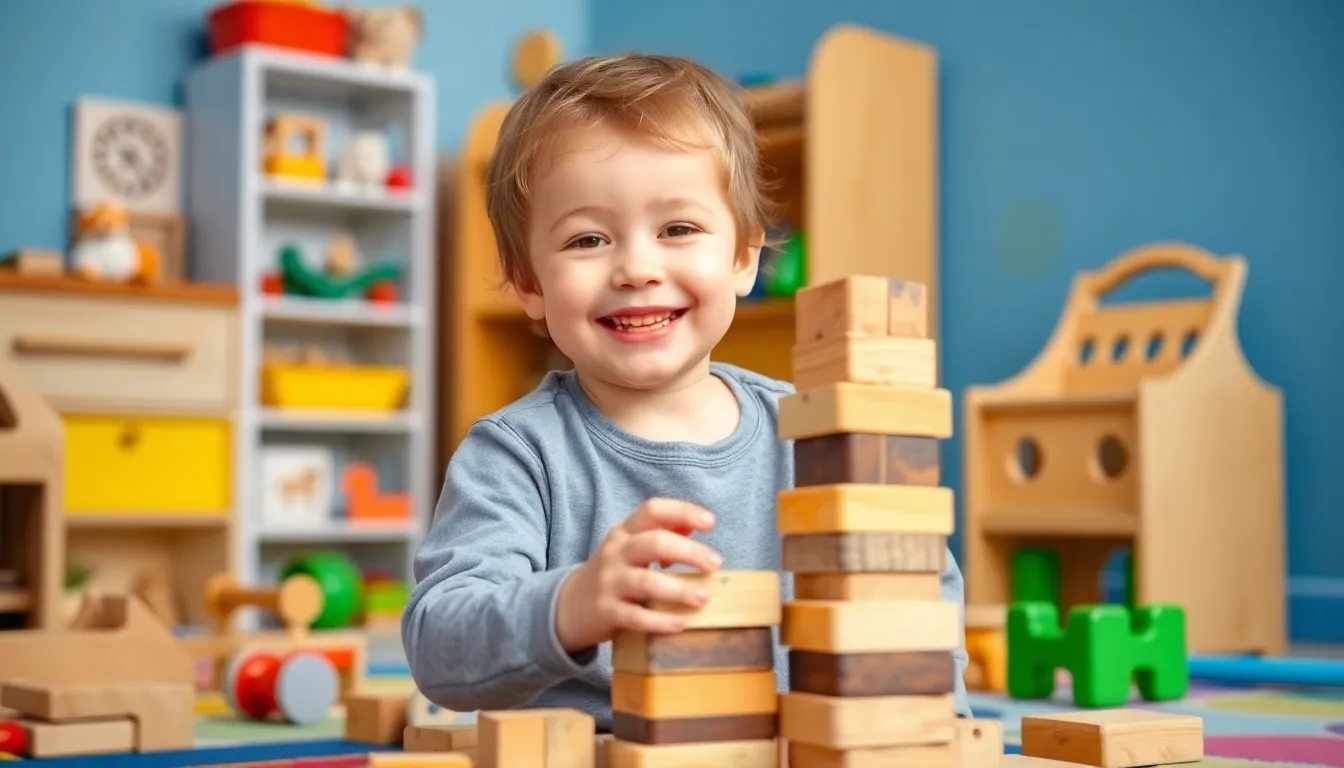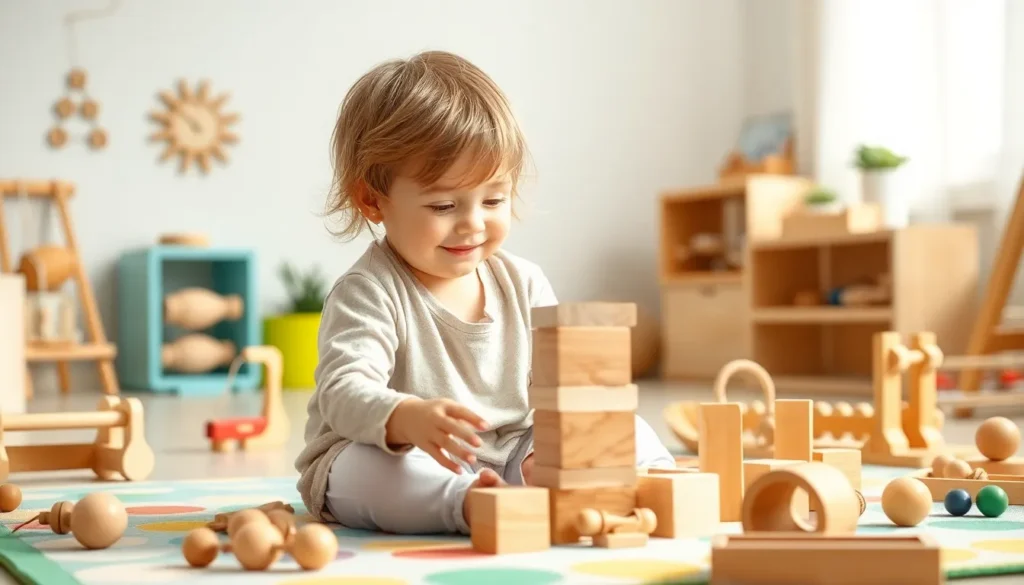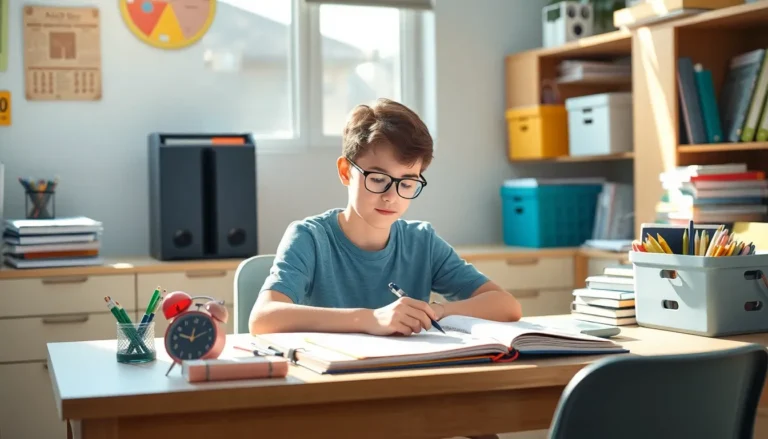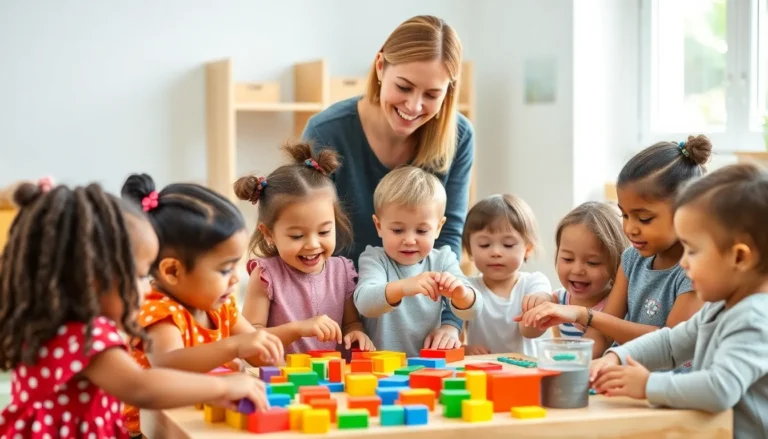Table of Contents
ToggleIn a world where screens seem to rule, Montessori educational toys offer a refreshing escape back to hands-on learning. These aren’t just any toys; they’re the secret sauce to sparking creativity and independence in young minds. Imagine a toddler building a tower that’s not just a pile of blocks, but a gateway to understanding balance and gravity. Who knew playtime could double as a science lesson?
What Are Montessori Educational Toys?
Montessori educational toys focus on fostering a child’s natural development through play. Designed to enhance specific skills, these toys promote independent thinking and problem-solving abilities. Children engage with materials that spark curiosity and encourage exploration, allowing them to learn at their own pace.
Many Montessori toys are crafted from natural materials like wood, which provide a tactile experience that plastic often lacks. Examples of these toys include building blocks, threading beads, and shape sorters. Each toy serves a purpose, helping children grasp concepts such as size, shape, and color. They also develop fine motor skills as kids manipulate objects.
Structured activities encourage collaboration and communication between children. These interactions often lead to improved social skills, as children learn to share, negotiate, and work together on tasks. Giving children the freedom to choose their activities fosters self-discipline and motivation.
Research shows that Montessori methods can lead to better academic performance and a deeper understanding of subjects in later years. In addition, skills developed through play with Montessori toys can translate into lifelong learning habits. Selecting high-quality, age-appropriate options ensures that the educational value remains intact.
Parents and educators often find that incorporating Montessori educational toys into their learning environments creates dynamic and effective learning experiences. Such toys bridge the gap between play and education, making learning engaging and fun for children.
Benefits of Montessori Educational Toys

Montessori educational toys promote active learning, supporting children’s growth through engaging play. These toys aid in developing essential skills while making the learning process enjoyable.
Enhancing Cognitive Development
Cognitive development improves through the use of Montessori toys. Toys like building blocks and puzzles stimulate critical thinking and problem-solving skills. Engaging with these materials helps children understand spatial relationships and basic math concepts. Increased sensory experiences deepen their learning. Research shows that children using Montessori toys often perform better academically. Therefore, integrating these toys into everyday activities promotes effective learning.
Fostering Independence
Independence flourishes with Montessori educational toys. By allowing children to explore and manipulate their environment, they develop a sense of autonomy. Toys such as threading beads or shape sorters encourage self-directed learning. Children learn to make choices and face challenges independently. Encouraging this independence benefits overall confidence and decision-making skills. Thus, parents and educators can support this growth by providing opportunities for exploration.
Encouraging Social Skills
Social skills develop significantly through collaborative play with Montessori toys. Children who engage in group activities with these toys learn to communicate and share effectively. Playing alongside peers teaches valuable lessons in teamwork and cooperation. For instance, working together on a construction project fosters discussion and negotiation. Evidence suggests that children who play collaboratively exhibit better social behaviors. Consequently, incorporating these toys in learning environments promotes social readiness for future interactions.
Types of Montessori Educational Toys
Montessori educational toys come in various categories, each designed to support different aspects of a child’s development. Understanding these types helps parents choose the right toys for their children.
Sensorial Toys
Sensorial toys stimulate the senses, allowing children to explore textures, sounds, and colors. Tools like texture boards and sound boxes enhance sensory perception. Through manipulating these items, children refine their sensory awareness, learning to differentiate between various stimuli. Additionally, these toys promote cognitive development as kids associate sensory experiences with their environment. Engaging with sensorial materials fosters concentration and encourages exploration.
Practical Life Toys
Practical life toys encourage children to engage in real-life tasks, supporting their independence and self-sufficiency. Items like child-sized kitchen tools and gardening sets help children learn daily skills. Completing these tasks fosters responsibility and fine motor skills. As children pour, scoop, and button, they gain confidence in their abilities. The hands-on experience nurtures problem-solving skills, instilling a sense of accomplishment as they master everyday activities. These toys cultivate a child’s understanding of their role in the family and community.
Language and Literacy Toys
Language and literacy toys facilitate early language development and communication skills. Tools like alphabet blocks and storybook sets provide diverse literacy experiences. Engaging with these materials enhances vocabulary and comprehension. As children play with word puzzles or rhyming games, they develop critical language skills through fun interactions. Storytelling sets inspire creativity and imaginative thinking, promoting narrative skills. These toys lay a strong foundation for reading and writing, preparing children for future academic success.
How to Choose the Right Montessori Educational Toys
Choosing the right Montessori educational toys involves considering several key factors that enhance a child’s learning experience.
Age Appropriateness
Age appropriateness plays a crucial role in selecting Montessori toys. Toys should match a child’s developmental stage to ensure engagement and effectiveness. For infants, toys that encourage grasping and sensory exploration are ideal, such as rattles and soft blocks. Toddlers benefit from toys promoting fine motor skills, like stacking rings and shape sorters. Preschoolers thrive with more complex options, including puzzles and building sets that challenge their problem-solving abilities. Parents can check age recommendations on packaging as a quick guide. Ensuring toys align with developmental milestones fosters exploration and learning.
Quality and Safety
Quality and safety are essential when selecting Montessori educational toys. Opting for high-quality materials guarantees durability and longevity. Wooden toys, often used in Montessori settings, provide tactile experiences typical of this approach. Safety standards should be a priority; select toys free from toxic substances and sharp edges. Reliable products often feature certifications from organizations like ASTM or CPSC. Reviews and recommendations from trusted sources aid in making informed decisions. Investing in quality toys results in both safety and lasting educational benefits.
Montessori educational toys offer a unique approach to learning that aligns with children’s natural development. By emphasizing hands-on experiences and independent exploration these toys not only stimulate cognitive growth but also enhance social skills. Parents who choose quality materials that are age-appropriate ensure their children benefit from engaging play that fosters creativity and problem-solving abilities.
Integrating Montessori toys into daily routines creates an enriching environment where learning becomes a joyful experience. This approach empowers children to develop essential skills that will serve them well in their academic journeys and beyond. Investing in Montessori educational toys is a step toward nurturing confident and capable learners.





